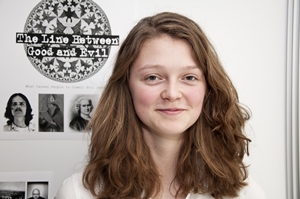Anna Rømcke Høiseth fra Frogn videregående skole vant førsteprisen i 2011-utgaven av Fritt Ords ungdomskonkurranse med essayet “The Line Between Good and Evil”. Vox Publica presenterer her Høiseths sammenfatning av arbeidet. Du kan også laste ned essayet i sin helhet (pdf).
Summary
Evil comes in many shapes and forms. Whether it is dictators responsible for horrible genocides, prison guards in Abu Ghraib, or two young, English boys brutally murdering the two-year-old James Bulger. When exposed to such evil, we are shocked and sickened, but perhaps most of all, fascinated. How is it possible for people to go through with these atrocities? We might then distance ourselves from the evildoers, and claim that we could never act in such a way. But is it only the sociopaths and the «bad apples» that commit evil deeds? Are they only the exceptions, and not the majority? Or is everyone capable of carrying out evil deeds?
From these questions I formulated the specific research question: “What causes people to commit evil deeds?” To answer this, I began by searching for the most useful definition of evil. I found that evil is often defined as noncompliance with social norms. This definition alone is not enough, since such norms are not automatically good in themselves. Furthermore, an evil deed must cause harm or injury, and most often with the intention of doing so. I then turned to the Norwegian philosopher Lars Fr. H. Svendsen and his four categories of evil: the demonic, the ignorant, the idealistic and the ignorant form of evil. These proved to be useful throughout my essay.I split the rest of the essay into two parts: individual evil and collective evil. Each section had a statement which I assessed. These were: “People are essentially good or evil” and “People are situationally evil”. In the first part I examined serial killers and sociopaths, and their reasons for committing evil deeds. Two of the main reasons were lack of empathy, and the feeling that social norms do not apply to them. Furthermore, their evil fell into the categories of idealistic and ignorant evil. To discuss the statement “People are essentially good or evil” further, I turned to the philosophies of Kant, Augustin and Rousseau. My conclusion with regard to the first statement was that people are not essentially good or evil, but that some are more likely to commit evil deeds because of their genes and upbringing.
In the next part I discussed the statement “People are situationally evil”. Here I looked at the Milgram Experiment, the Stanford Prison Experiment, the events that took place in Abu Ghraib and the Rwandan genocide. All these cases are examples of how ordinary people can become perpetrators, if placed in the right situation. People will more easily follow social norms than breach them, even when the norms of a society or a social group are evil. The threshold for breaching these norms is so high that few have the courage to become deviants. Another cause is the creation of a generalized image of the enemy, which leads to seeing other people as group instead of individuals. Through the process of dehumanization, evil deeds are more easily committed.
My conclusion is that of the two statements above, the latter is the most valid. I think almost anyone can commit evil deeds, even though some might be more likely to do so. Another conclusion I have I arrived at — while working on this essay — is that evil is a dangerous term and must be used with caution. By branding “the others” as evil we name ourselves “the protectors of good”. If we do not realize that we have the capacity to commit evil deeds, we cannot be prepared to protect ourselves from powerful situational and systemic forces. Also, we must try our best to understand the perpetrators, and immediately naming them evil is not at all wise.
Furthermore, we must be prepared in some situations to become deviants, for the right thing may be to breach the norms of a society or group.

